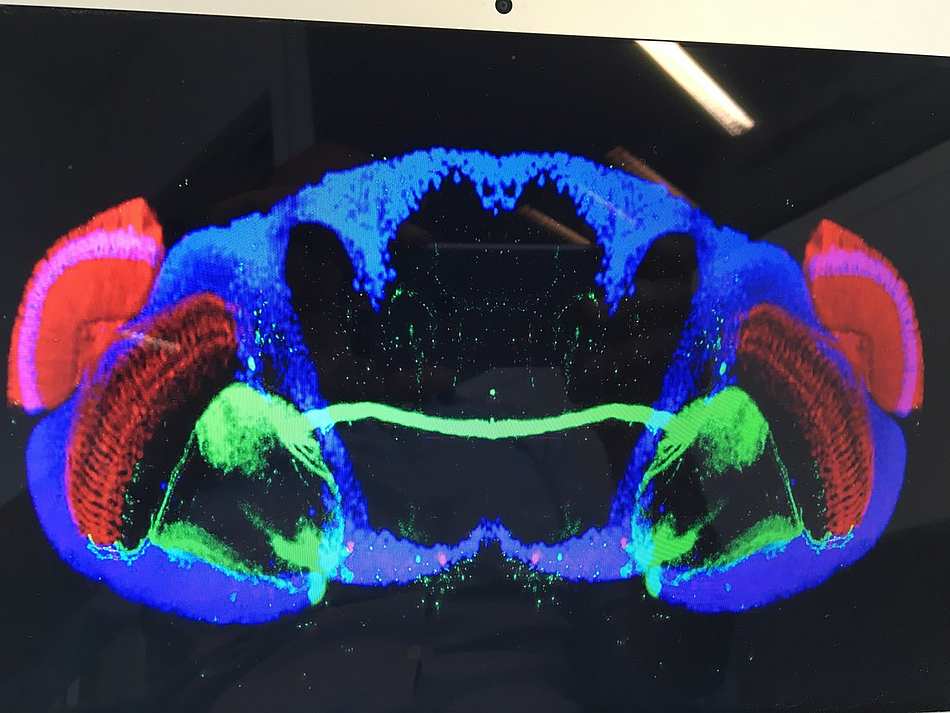The fruit fly man
Bassem Hassan researches the connection between brain development in fruit flies and their individual behavior. A chat between Paris and Berlin.
Hi Bassem, where are you at the moment?
On the couch in my office at the ICM!
You do research on the brains of fruit flies. What do you do if you catch them in your kitchen – do you kill them?
No, I like them too much to do that. Instead, I try to observe them. After all, I’ve already been working with fruit flies for almost 25 years.
For the layperson, it’s difficult to imagine that such a tiny fruit fly brain can be a fruitful field of research...
That may be, but the brain of the fruit fly has already been a subject of research for decades. We owe many discoveries about the development and the functioning of the brain to this insect.
Can you give us some idea of how complex a fruit fly’s brain is?
It’s very small but manages to accommodate over 100,000 neurons in less than one cubic centimeter. That’s pretty impressive, don’t you think?
Absolutely! You just mentioned that you like observing fruit flies. Do they display individual behavior?
Yes, they do – in a number of ways… But that can only be determined in the lab, under controlled conditions. In the kitchen on a Saturday afternoon, it’s considerably more difficult!
What can you observe in the lab?
That, for example, some flies can learn better than others if it’s a matter of solving a task. In my lab, we’re particularly interested in how their intrinsic responses to the world differ – that is, their inborn, non-learned responses. We want to understand how their brains develop and how this affects their individuality.
And does it?
We’re working on finding that out. It took a long time to translate that question into experiments. The basic idea is that the brain, which develops slightly differently in each fly, could also confer intrinsic individual abilities.
And is that irrespective of the DNA?
Yes. As with any tissue or organ, with the brain too, a certain degree of chance determines how it develops, beyond the influence of the DNA. I find the thought that we owe our individuality to something unpredictable extremely fascinating.
How exactly do you research the connection between brain development and individuality?

Funding Program
Einstein BIH Visiting Fellows
Funding period
2016 – 2021
Project title
The developmental basis of neuronal circuit wiring variability and its contribution to behavior
Research area
Developmental neurobiology
Institution
Charité – Universitätsmedizin Berlin
Since 2016
Principal investigator “Genetics and Physiopathology of Epilepsy“ am ICM Brain & Spine Institute, Paris, France
2002 – 2016
Professor at the KU Leuven, Leuven, Belgium
2001 – 2015
Principal investigator at the VIPB Center of the Biology of Disease, Belgium
First, we work out the task for which a group of neurons is responsible – for instance, moving towards an object that interests the fly. Then we examine whether any differences in the development of the relevant neurons can be detected in the flies and whether those differences also have an effect on the way the individual flies approach an object. Finally, we manipulate the neurons themselves and try to predict what effects this could have on their behavior. This sounds simple but takes years of experimentation.
You observe how neurons develop?
Yes, we use innovative microscopes to look into the brains of fruit flies, which we manipulate genetically so that colored proteins form in the neurons. A particularly cool technique, which we owe to Peter Robin Hiesinger’s laboratory in Berlin, makes it possible to follow the development of neurons in the larval stage of the fruit flies live!
That’s incredible! What does something like that look like?
Hold on a moment.
Do you feel humbled when you watch the brain as it takes shape?
And how! On the one hand, it’s hugely complicated and a great challenge, while on the other hand it’s incredibly beautiful and fascinating. You’d probably never get so close to the moment of creation otherwise. I find that extremely exciting!
Are you also hoping to uncover the fundamental principles of evolution through studying the brain?
Of course, you always hope to discover something fundamental, but it would already be enough for me if I could answer the small questions that go through my mind. But obviously it would be great if it turned out that one and the same DNA can produce different brains and that this in fact leads to individuals being, well, individuals! This could even help us to better understand why people with a disease that causes genetic mutations suffer in varying degrees and respond differently to the very same therapy.
Bassem, what is it about the life of a researcher that you like?
It’s enormously stimulating to work on the cutting edge of human knowledge every day... It’s really great. I also like finding out new things, solving riddles and having that profound feeling that’s so difficult to express in words, when you’ve finally understood something you’ve been trying hard to crack for a long time. The childlike urge to play and childlike curiosity have never been quenched in me.
I think you’ve convinced me for my next lifetime! Thank you for taking time for our chat.
You’re welcome, Mirco. It was fun.
Where are you off to now?
Physically, to a lecture that I have to give here at the ICM in 30 minutes’ time. Metaphorically, who knows... After all, life ultimately remains a mystery.
Published in Albert Nr. 2, the journal of the Einstein Foundation Berlin.
Interview: Mirco Lomoth / Einstein Foundation
Photo: Einstein Foundation Berlin / Pablo Castagnola and Bassem Hassan
